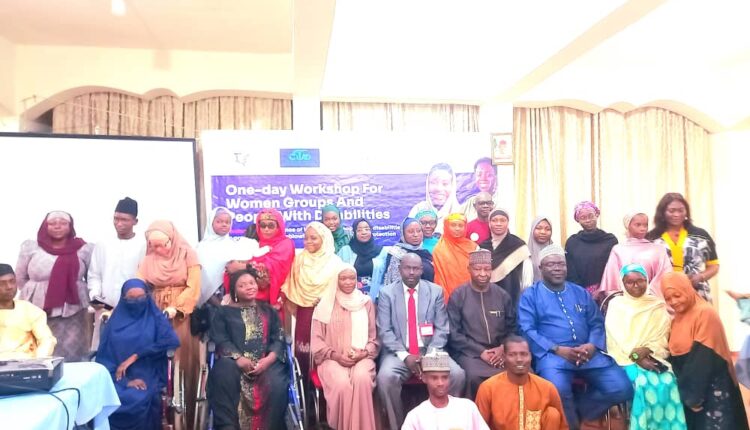AFRICMIL encourages women,PWDs to support fight against corruption
The African Centre for Media and Information Literacy (AFRICMIL) has urged women and people with disabilities to join the fight against corruption, emphasizing their important roles in combating corruption and promoting accountability in Nigeria.
Dr. Chido Onumah, AFRICMIL’s Coordinator, made this call on Thursday in Kano at a one-day training session for women groups and people with disabilities.
Represented by Godwin Onyeacholem, AFRICMIL’s Program Manager, Dr. Onumah explained that the workshop aimed to encourage these groups to report illegal activities and actively participate in the fight against corruption in Nigeria.
He emphasized the importance of gender and social inclusion in this battle, noting that women and people with disabilities are often the most affected by corrupt practices.
“I warmly welcome you all to this event, which we consider strategic in our whistleblower protection advocacy at the African Centre for Media and Information Literacy (AFRICMIL),” Onumah said.

Read Also:SolaceBase report nominated for award
“AFRICMIL’s mission is to enhance media and information literacy for effective social engagement describing their work on the Corruption Anonymous (CORA) project, which collaborates with government and civil society organisations is to support the federal whistleblowing policy.”
Dr. Onumah also acknowledged the support of partners such as the Presidential Initiative on Continuous Audit (PICA), the Centre for Information Technology and Development (CITAD), and the MacArthur Foundation, expressing gratitude to the participants and special guests.
SolaceBase reports that the theme of the workshop focused on the importance of women and people with disabilities in promoting whistleblowing and protecting whistleblowers.
Muhuyi Magaji Rimin Gado, Chairman, Kano State Public Complaints and Anti-Corruption Commission (PCACC), represented by CSP Salisu Sallari, emphasized that eradicating corruption requires collective effort.
“We all have a role to play. The fight against corruption is a persistent battle that requires a multi-pronged approach,” he called for continued efforts to strengthen institutions, empower investigative bodies, and foster a culture of integrity within the public sector.
Read Also:SolaceBase Data: Amid health challenges, Kano suffers from poor health budget execution
Presenting a paper at the event, Dr. Rukayya Aliyu from the Department of Information and Media Studies, Bayero University Kano sheds light on why women and people with disabilities should join the fight against corruption through whistleblowing.
She emphasized that whistleblowing is a risky venture with a high price to pay, stressing the importance of protecting those who expose wrongdoing.
Read Also:AFRICMIL urges ICPC to investigate fraud, violation of police trust fund Act
Dr. Aliyu highlighted that corruption is pervasive in Nigeria, even affecting the education sector, where students engage in corrupt practices during examinations.
“When you report on such issues and it brings a positive outcome, you blow the whistle. Corruption can involve anyone, and its effects impact all of us in society. This is why we must see it as a universal issue that we need to fight together,” she said.
Read Also:SolaceBase Data: Without FAAC, Katsina, Jigawa would have been unable to pay salaries in Q1, 2024
Dr. Aliyu also linked Nigeria’s insecurity to corruption and encouraged reporting even minor issues, such as drug abuse, to help combat corruption. She advocated educating women and people with disabilities about whistleblowing and making the process less stressful to encourage participation.
Another resource person, Abdullateef Abubakar Jos, Editor-in-Chief, SolaceBase Communications Limited, spoke on the role of the media in promoting whistleblowing and protecting whistleblowers among women and people with disabilities in Nigeria.
Jos highlighted the significant economic, social, and political impacts of corruption, noting that it leads to resource misallocation, deters investments, increases costs for businesses, and reduces overall productivity.
Read Also:Justice For Abdullahi Sambo, Victory For Whistleblowers In Nigeria
He stressed that corruption undermines trust in public institutions, perpetuates inequality, and impedes access to essential services, disproportionately affecting the poor. Politically, it weakens governance structures, fuels instability, and reduces public confidence in leaders and the electoral process.
“Whistleblowing is vital as it exposes hidden corruption, deters potential corrupt activities, promotes accountability, and fosters ethical culture,” Jos said.
He added that the media plays a crucial role by raising awareness, advocating stronger protections, providing platforms for anonymous reporting, and emphasizing the need for robust protection mechanisms.
Jos noted that women face greater social stigma, workplace discrimination, and underrepresentation in leadership, making it harder for their reports to be taken seriously. People with disabilities encounter physical, technological, and communication barriers, as well as prejudices that can affect the credibility of their reports.
Hamza Aminu Fagge, a participant from the Centre for Information Technology and Development (CITAD), expressed gratitude to the organizers and promised to apply the knowledge gained during the training.



Comments are closed.